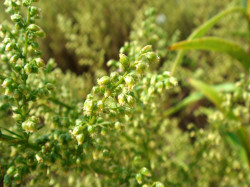Yin Chen Interactions Overview
Check For Interactions With Yin Chen
Yin Chen
- Armoise à Balais
- Armoise Capillaire
- Artemisia Officinalis
- Capillary Wormwood
- Ceinture de Saint-Jean
- Chiu
- Couronne de Saint-Jean
- In Chen
- Inchin-Ko-To
- Inchinko
- Injin
- Kyunchinho
- Rumput Roman
- Artemisia capillaris
 Yin chen (Artemisia capillaris) is an herb that is native to East Asia and is commonly used in traditional Chinese medicine (TCM). It is also known as "hairy wormwood" or "capillary wormwood," due to the fine, hair-like leaves of the plant.
Yin Chen is purported to have a number of medicinal properties and is used to treat a variety of ailments, including digestive disorders, respiratory infections, and skin conditions. It is also believed to have antibacterial, antiviral, and anti-inflammatory effects, and is often used to boost the immune system and promote healing. Yin chen is typically consumed as a tea or in a powdered supplement form. Yin Chen is a component of the popular 'Yin-care Herbal Wash' product.
Yin chen (Artemisia capillaris) is an herb that is native to East Asia and is commonly used in traditional Chinese medicine (TCM). It is also known as "hairy wormwood" or "capillary wormwood," due to the fine, hair-like leaves of the plant.
Yin Chen is purported to have a number of medicinal properties and is used to treat a variety of ailments, including digestive disorders, respiratory infections, and skin conditions. It is also believed to have antibacterial, antiviral, and anti-inflammatory effects, and is often used to boost the immune system and promote healing. Yin chen is typically consumed as a tea or in a powdered supplement form. Yin Chen is a component of the popular 'Yin-care Herbal Wash' product.
Additional Details
Is Yin Chen Safe? Are There Any Warnings?
Yin chen, also known as capillary wormwood, should not be confused with other wormwood varieties like Artemisia herba-alba, Sweet Annie, or Mugwort. It's generally considered safe when used orally and appropriately, but high doses (15 grams or more) can lead to adverse effects, including numbness, tremors, arrhythmias, and fainting. Pregnant and lactating individuals should avoid its use.
How Is Yin Chen Thought To Work? What Is the Mechanism of Action?
Yin chen is sourced from two species of Artemisia, namely A. scoparia and A. capillaris. The above-ground parts of this plant contain various constituents, including chlorogenic acid, esculetin, flavonoids, and sesquiterpene lactones. The essential oil of yin chen consists of compounds like alpha-pinene, limonene, and beta-caryophyllene.
Yin chen's mechanisms of action encompass:
- Antibacterial Effects: Its essential oil has demonstrated antibacterial properties against various bacteria, possibly through morphological changes and membrane leakage.
- Anticancer Effects: Research indicates that yin chen extract can induce apoptosis and inhibit cancer cell proliferation by targeting cellular signaling pathways. It also hinders the migration and invasion of cancer cells into healthy tissues.
- Anti-Inflammatory Effects: An aqueous extract of yin chen has been found to reduce the production of inflammatory cytokines and nitric oxide levels.
- Antiviral Effects: Yin chen exhibits antiviral effects against hepatitis B virus (HBV) in laboratory settings, possibly due to specific compounds.
- Hepatoprotective Effects: Yin chen can protect the liver against injury and stimulate bile secretion. It may also prevent apoptosis of liver cells in various hepatitis conditions.
- Lipid Lowering Effects: In animal studies, a combination of herbs containing yin chen has been associated with reduced body weight, total cholesterol, and triglycerides.
- Sedative Effects: Studies on mice suggest that yin chen has sedative-hypnotic effects, potentially related to the potentiation of the GABA-A receptor.
Pharmacokinetics
There is limited reliable information available regarding the pharmacokinetics of yin chen.
Interaction Overview
With Drugs: Yin chen may interact with CNS depressants and pentobarbital, enhancing their therapeutic and adverse effects.
With Supplements: Yin chen may have sedative effects and interact with other herbs and supplements with sedative properties.
With Conditions: Specific interactions with medical conditions are not known.
With Lab Tests: There are no known interactions with lab tests associated with yin chen.
Common Side Effects To Watch For
Common side effects of yin chen use include abdominal distension, dizziness, and nausea. While these are generally mild, serious adverse effects like cardiac arrhythmias, fainting, numbness, and tremors are rare but possible.
Are Supplements Standardized?
There is a lack of reliable information regarding the standardization of yin chen supplements.
What Is Yin Chen Typically Used For?
Yin chen has been explored for several potential uses, but there is insufficient reliable evidence to support its effectiveness for these purposes. These include:
- Asthma
- Biliary disorders
- Dysmenorrhea
- Liver disease
- Metabolic syndrome
- Neonatal jaundice
More research is needed to determine the efficacy of yin chen for these conditions.
Drugs that interact with Yin Chen
Return to the main supplement interaction checker page
Parts of this content are provided by the Therapeutic Research Center, LLC.
DISCLAIMER: Currently this does not check for drug-drug interactions. This is not an all-inclusive comprehensive list of potential interactions and is for informational purposes only. Not all interactions are known or well-reported in the scientific literature, and new interactions are continually being reported. Input is needed from a qualified healthcare provider including a pharmacist before starting any therapy. Application of clinical judgment is necessary.
© 2021 Therapeutic Research Center, LLCs